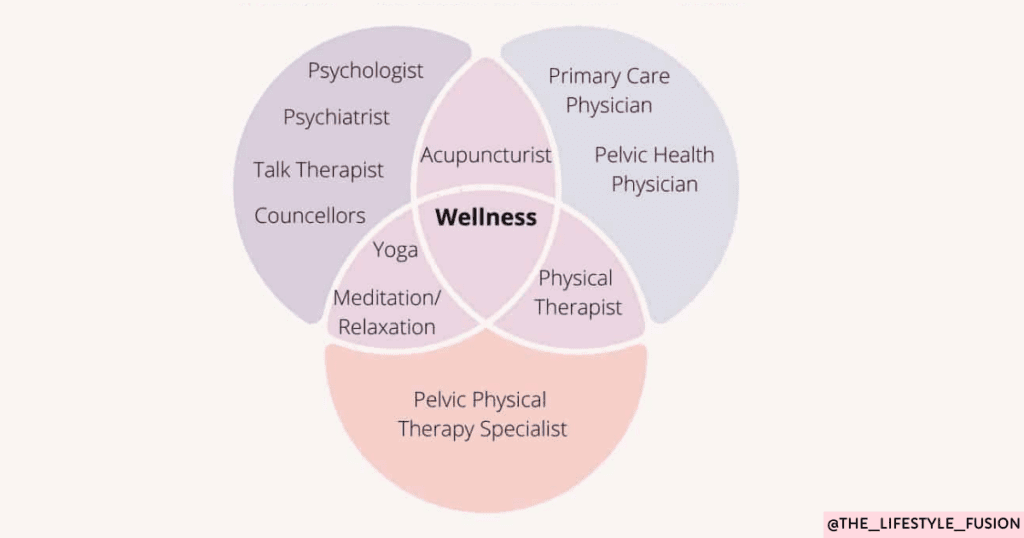– Introduction:
Physical therapy and mental health share a harmonious relationship that reaches past the customary limits of medical care. At its center, active recuperation means to restore people recuperating from wounds, medical procedures, or persistent circumstances, zeroing in fundamentally on reestablishing actual capability and reducing torment.
Be that as it may, the effect of active restoration frequently rises above the domain of the actual body, impacting mental prosperity in significant ways.
As healthcare continues to evolve, fostering greater collaboration between physical therapists and mental health professionals holds the promise of delivering more comprehensive and effective care that addresses the multifaceted needs of individuals striving for optimal health and vitality.
– The Surprising Link: Physical Therapy and Mental Health
The elementary part of this relationship between physical therapy and mental health lies in the acknowledgment that actual well-being essentially influences psychological well-being.
Constant distress, portability restrictions, and handicaps can correct a weighty cost for people, prompting mental pain, misery, and uneasiness. Actual illnesses cause inconvenience as well as disturb everyday exercises, social communications, and by and large personal satisfaction.
By resolving these actual issues through designated intercessions like activities, manual treatment, and ergonomic changes, exercise-based recuperation can relieve torment, improve versatility, and reestablish capability. In doing so, it lightens the mental weight related to actual illnesses, accordingly encouraging superior mental prosperity.
Moreover, physical therapy adopts a holistic approach that acknowledges the interconnectedness of physical therapy and mental health, along with the social factors influencing health outcomes.
Physical therapists often assess not only the physical symptoms but also the psychological and emotional aspects of their patient’s conditions. They recognize that mental health issues such as stress, depression, or trauma can impact physical recovery and adherence to treatment plans.
As such, physical therapists may integrate strategies to address psychological barriers, provide emotional support, and promote self-efficacy and resilience in their patients. This collaborative approach may involve liaising with mental health professionals, such as psychologists or psychiatrists, to ensure comprehensive care that addresses both the physical and mental dimensions of health.
Furthermore, exercise, a cornerstone of physical therapy, is well-established as a potent mood enhancer and stress reliever. Regular physical activity has been shown to stimulate the release of endorphins, neurotransmitters responsible for feelings of happiness and well-being, while also reducing levels of stress hormones such as cortisol.
Physical therapists often prescribe tailored exercise programs designed to improve strength, flexibility, and overall physical function. To ensure physical therapy and mental health, these exercises not only facilitate physical rehabilitation but also serve as powerful tools for promoting mental wellness.
Engaging in structured physical activities during therapy sessions can instill a sense of accomplishment, self-confidence, and mastery over one’s body, all of which are integral to positive mental health outcomes.
In essence, the relationship between physical therapy and mental health underscores the interconnectedness of mind and body in achieving holistic well-being. Physical therapy emerges as a pivotal ally in promoting mental wellness and resilience by addressing physical ailments, adopting a biopsychosocial approach, and harnessing the therapeutic benefits of exercise.
– Understanding Further in Recent Parameters:
In recent years, the relationship between physical therapy and mental health has gathered increasing attention from healthcare professionals and researchers alike. While traditionally viewed as distinct domains of healthcare, emerging evidence suggests a profound interconnection between physical well-being and mental wellness.
In this blog, we investigate the fascinating correlation between physical therapy and mental health, backed by compelling statistical facts and scientific insights.
Physical therapy, often associated with rehabilitation and injury recovery, extends its impact far beyond the realm of the physical body. Research indicates that individuals facing physical challenges, such as chronic pain, mobility limitations, or disabilities, are more susceptible to mental health issues like depression and anxiety.
According to a study published in the Journal of Physical Therapy Science, approximately 30% of patients receiving physical therapy services exhibit symptoms of depression or anxiety (most commonly found in adults), highlighting the prevalence of mental health concerns among this population.
– The Statistical Landscape of Physical Therapy and Mental Health:

Let’s delve deeper into the statistical landscape surrounding physical therapy and mental health:
-
Prevalence of Mental Health Disorders
Studies have found that individuals with chronic musculoskeletal conditions, such as arthritis or back pain, are at a higher risk of developing depression and anxiety.
Research published in the Annals of Rheumatic Diseases revealed that the prevalence of depression among patients with rheumatoid arthritis is nearly twice as high as the general population, underscoring the substantial burden of mental health disorders within this demographic.
-
Physical Activity Implications
Physical activity, a cornerstone of physical therapy, has been shown to have profound effects on mental health. According to the World Health Organization (WHO), regular exercise can reduce the risk of depression by up to 25%.
Moreover, a meta-analysis published in JAMA Psychiatry found that exercise interventions significantly alleviate symptoms of depression, with effects comparable to psychotherapy and pharmacotherapy.
-
Biopsychosocial Approach to Treatment
Physical therapists adopt a holistic biopsychosocial approach to patient care, recognizing the various social factors with a complex interplay between physical therapy and mental health. By addressing both the physical symptoms and underlying psychological distress, physical therapy interventions can yield comprehensive outcomes.
Research published in the Physical Therapy Journal underscores the effectiveness of this approach, demonstrating improved functional outcomes and decreased psychological distress among patients receiving integrated physical and psychological interventions.
– The Therapeutic Role of Physical Therapy:
To realize the connection between physical therapy and mental health, there are various mechanisms that physical therapy catalyzes accommodate in promoting mental wellness including:
-
Pain Management
Chronic pain is a significant contributor to mental health disorders, often exacerbating feelings of frustration, helplessness, and despair. Physical therapists employ evidence-based strategies, including manual therapy, therapeutic exercises, and pain education, to alleviate pain and improve pain coping mechanisms, thereby enhancing psychological well-being.
-
Functional Restoration
Physical therapy interventions aim to restore physical function and enhance mobility, empowering individuals to regain independence and autonomy in their daily lives. The sense of accomplishment and mastery associated with achieving functional milestones can bolster self-esteem and foster a positive outlook on life.
-
Empowerment and Self-Efficacy
Through personalized treatment plans and ongoing support, physical therapists empower individuals to take an active role in their rehabilitation journey. By encouraging a sense of self-efficacy and resilience, physical therapy equips individuals with the tools and confidence needed to overcome physical and mental health challenges.
– Cracking Physiotherapy’s Potential in Mental Health:

Last but not least, physiotherapy plays a crucial role in mental health by addressing the interrelation between physical therapy and mental health. Physiotherapy predominantly emphasizes manual, hands-on therapies, including fascial releases and soft tissue, stretches, massages, etc.
The primary distinction between physical therapy and physiotherapy lies in their respective approaches to healing and rehabilitation. It is more like a convenient way to perform physical therapy.
Statistical evidence supports the efficacy of physiotherapy interventions in enhancing mental health outcomes, underscoring the importance of integrating physical and mental health care approaches.
Here’s a breakdown of its role along with reasoning and statistical facts:
1. Physical Activity and Mental Health
-
Reasoning
Physical activity is known to have significant positive effects on mental health by reducing symptoms of anxiety, depression, and stress. Exercise releases endorphins, neurotransmitters that promote feelings of happiness and well-being.
-
Statistical Facts
Numerous studies have demonstrated the efficacy of exercise in improving mental health. For example, a meta-analysis published in the American Journal of Psychiatry found that exercise significantly reduces symptoms of depression, with effect sizes comparable to antidepressant medication.
2. Improving Functional Abilities
-
Reasoning
Physiotherapy aims to improve physical function and mobility, which can enhance an individual’s ability to engage in daily activities and participate in social interactions. This can positively impact self-esteem and overall mental well-being.
-
Statistical Facts
Research published in the Journal of Psychiatric and Mental Health Nursing suggests that physiotherapy interventions, such as exercise programs and mobility training, can improve functional abilities and quality of life in individuals with mental health disorders.
3. Pain Management
-
Reasoning
Many individuals with mental health conditions also experience chronic pain, which can exacerbate symptoms of depression and anxiety. Physiotherapy interventions, such as manual therapy and therapeutic exercises, can help manage pain and improve overall psychological well-being.
-
Statistical Facts
A systematic review published in the journal Pain Medicine found that physiotherapy interventions, including exercise therapy and manual techniques, are effective in reducing pain intensity and improving physical function in individuals with chronic pain conditions.
4. Stress Reduction and Relaxation Techniques
-
Reasoning
Physiotherapists often incorporate stress reduction and relaxation techniques into their treatment plans, such as breathing exercises, mindfulness, and progressive muscle relaxation. These techniques can help individuals manage stress and anxiety more effectively.
-
Statistical Facts
Research published in the Journal of Bodywork and Movement Therapies suggests that relaxation techniques integrated into physiotherapy interventions can reduce symptoms of anxiety and improve overall psychological well-being.
5. Promoting Adherence to Treatment
-
Reasoning
Physiotherapy interventions can promote adherence to mental health treatment plans by providing individuals with tangible goals, support, and encouragement. By addressing physical health concerns, physiotherapy can enhance motivation and engagement in mental health care.
-
Statistical Facts
Studies have shown that integrating physiotherapy into multidisciplinary mental health care settings can improve treatment adherence and outcomes. For example, a study published in the Journal of Psychiatric Research found that individuals receiving integrated physiotherapy and mental health care had higher rates of treatment adherence and greater improvements in symptoms compared to those receiving standard care alone.
– Conclusion: Integrating Care for Optimal Outcomes
In conclusion, the correlation between physical therapy and mental health underscores the intrinsic link between mind and body in achieving holistic well-being.
By addressing physical ailments, promoting physical activity, and adopting a biopsychosocial approach to care, physical therapy emerges as a vital component of mental health promotion and rehabilitation.
Fostering greater collaboration between physical therapists and mental health professionals holds immense promise in delivering integrated, patient-centered care that addresses the multifaceted needs of individuals striving for optimal health and vitality.
As we unravel the complexities of the physical therapy and mental health relationship, one thing remains clear: physical therapy is not just about treating the body—it’s about nurturing the whole person, body, and mind, towards a path of healing and resilience.






